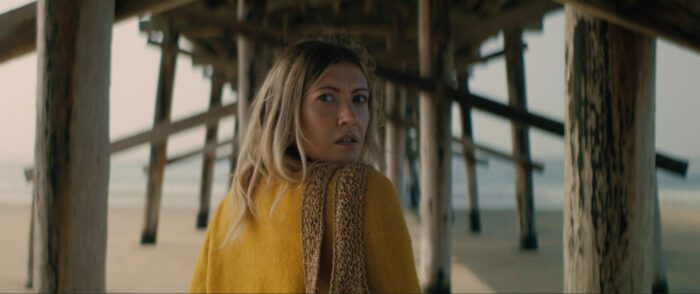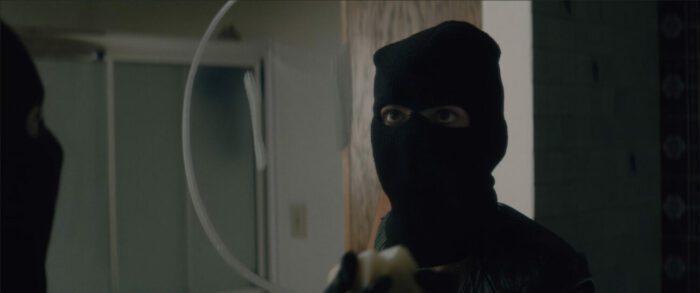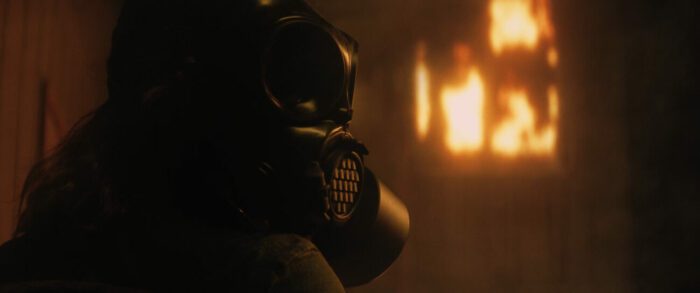Millennials have been dealt a rotten hand. They call us lazy, accuse us of ruining the country, and say we don’t want to work when we recognize our worth. It’s gotten to the point where the name-calling has become noise and nothing more. Andrew Adams seems to hear it too. His feature-length debut American Meltdown premiered at the Chattanooga Film Festival, and it is all about the horror of what chasing the American dream has become in the modern landscape. From workplace politics to authoritative indifference, Adams suggests all is not well with the world and provides a sumptuous commentary on wealth, power, and corporate culture through the eyes of a by-the-book woman who befriends a pickpocketing Robin Hood.
The relationship between Olivia Walker (Jacki Von Preysing) and Mari Navarro (Nicolette Sweeney) wouldn’t make sense on paper. Olivia has her life in order, or rather she did before her boyfriend (Christopher Mychael Watson) decided to move out, leaving her to pay rent by herself on an unaffordable property and before her boss put her on a leave of absence to circumvent providing her with benefits and then blaming unions which aren’t present at Olivia’s company. To top it off, when she gets home, her front door is ajar, and her house has been robbed. Calling the police proves to be an exercise in futility, as her property manager, Lou (Clayton Farris), shows up and gets the police to blame Olivia for not taking more protective measures against a home invasion.

In the wake of it being broken into, Olivia becomes immediately attentive to every sound the house makes and becomes increasingly paranoid that someone may still be inside. The police officer (Shaun Boylan) sent to take her statement doesn’t exactly ease her mind into feeling her home is a safe space again, either. Looking for jobs on the pier, Olivia meets Mari when the latter makes the former her mark, lifting Olivia’s wallet through clever misdirection. Once Mari sees her filling out applications, she returns the wallet, and the two begin forming a friendship. Scared to be in her house alone, Olivia asks Mari to take a break from her nomadic van-living lifestyle to stay at her place. Worry begins to plague Olivia when she realizes how little she knows about the person she’s invited into her life.
Andrew Adams says,
I’ve had my home broken into Five different times, and it always left me with a low-simmering paranoia and PTSD that basically turned my own home into a haunted house. The sort of thing where every creak and groan becomes way more terrifying than it should be. And so, the movie uses a break-in and its resultant paranoia as its inciting incident. I genuinely think this kinda stuff is what gives haunted house and home invasion thrillers their power—but I was trying to ground those feelings in my own lived experience.
Adams told me he began writing American Meltdown as a front-and-center horror offering before it took on a life of its own as a buddy comedy with dark overtones. Yet, something is compelling about the bleak millennial experience that pushes the movie into that territory, and you can see the framework of an underlying horror film, especially in its first half. Regardless, the film is social horror at its most relevant, alerting the watcher to serious dystopian problems that actually exist in the world. The self-proclaimed “coming-of-rage” story is rife with satire concerning the problems Millennials and Gen Z are suffering in a world tailored to the wealthy generations that came before them. And that fact helps Mari convince Olivia that a life of non-violent crime can help even things out a little.

Preysing and Sweeney have magnetic chemistry as an odd couple fueled by devil and angel shoulder conscience antagonism. Olivia is a bit of a goody-two-shoes and a people pleaser that has a hard time saying no to things, while Mari isn’t afraid to go after authoritative figures or even the playing field in her quest for fairness. American Meltdown‘s characters are two perspectives of the millennial experience, one trying to play by the rules and getting nowhere. The other has abandoned the game altogether after seeing that it’s rigged. Adams helps play to his characters’ strengths by creating situations where each’s unique mindset merit necessity. After all, it’s tough trying to live in black and white when the world is a haze of gray.
Adams’ ability to inject realistic absurdities, such as a property manager’s victim-blaming to incur no legal obligation from his tenant, or union blaming when there is no union, is representative of the sh*t end of the stick this generation was gifted and zero accountability by the people who handed it off. It gets even funnier when Olivia is brought to the police station and meant to judge her friend with a record as a bad apple in what ends up being the silliest “crime” ever (if you can call it that).

Luckily, Mari is able to circumvent the cacophony of chaos happening in Olivia’s life and provide the most human response to what Olivia is feeling, which becomes an undertone in the film. Mari, a practical stranger to Olivia, finds a way to normalize the crazy, anxiety-fueled situation and make Olivia feel like it isn’t her fault when everyone else is too full of themselves and the current cultural climate to offer solace or understanding.
American Meltdown is a fun and darkly satirical film with great performances, a wonderfully written script, exquisite cinematography, and comprehensive direction. The film paired well at the Chattanooga Film Festival with Sour Party, another film that shared the satirical impetus of millennial life in a buddy comedy package, though under a more Dude, Where’s My Car? approach. American Meltdown also ends in a way you won’t see coming, offering an outlandish and irreverent surprise that leaves you with a wide smile and cheering, and that’s a hell of a great way to close out an incredible festival.
American Meltdown played as part of the Chattanooga Film Festival. Badges for virtual attendees have been discounted for the remainder of the festival and will allow you access to the remaining virtual lineup through July 1.



